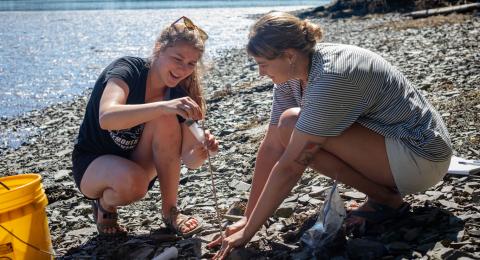Explore the science of life
Our biological sciences programs offer opportunities for research and study using the latest technology and equipment, in the lab or in the field. In far-away tropical rain forests and deserts, New Hampshire’s own lakes, forests, and seacoast, and in our state-of-the-art laboratories, PSU students work hands-on with faculty members to answer some of life’s toughest and most interesting questions.
Degree
The B.A. in Biology program is designed for students with an interest in biology and another companion field of study. It has fewer science credits and fewer required credits overall making it a great choice for students who would like an interdisciplinary experience such as a double major or major and two minors.
Plymouth State University also offers B.S. in Biology, B.S. in Environmental Biology, and the Biology Honors programs. Click the links in the degree names to find out more.
Other opportunities to study biology include minors in Biology, Neuroscience, Sustainability, and a variety of related areas.
Career
Most often, students with the B.A. in Biology will pursue a career requiring a general background in biology or the sciences or transition into a science adjacent field. Examples include science writing (B.A. in Biology combined with an English degree), bioinformatics (B.A. in Biology combined with a computer science degree), public health/epidemiology (B.A. in Biology combined with a Health or Global Health minor), or a similar interdisciplinary endeavor.
Please scroll down to see more about the curriculum, requirements, program details, and career paths.
The BA program in Biology is a broad overview of the principles of biology and the functions of biological systems with supportive courses in mathematics, physics, and chemistry. It can be used to fulfill the goals of students primarily interested in biology or those who plan to go on to professional programs or graduate degrees in the biological sciences. For the latter case, it should be noted that some professional/graduate schools require a full year each of organic chemistry, physics, and calculus; this program is less restrictive. Thus, students should work closely with their academic advisor to plan their coursework.
Curriculum & Requirements
| Course | Title | Credits |
|---|---|---|
| Major Requirements | ||
| BI 1110 | Biological Science I (TECO) | 4 |
| BI 1120 | Biological Science II | 4 |
| BI 2270 | Integrative Biology (WECO) | 4 |
| BI 3060 | Genetics | 4 |
| BI 3130 | Evolution | 4 |
| BI 3240 | Conservation (DICO,GACO) (Remove INCO,INCP) | 3 |
| BI 4980 | Biology Seminar | 2 |
| Complete 16 credits of Biology from the following (at least 8 of which must be at the 3000/4000 level): 1 | 16 | |
BI | 2000 level Biology electives (not BIDI) | |
BI | 3000/4000 level Biology electives (not BIDI) | |
| Writing in the Discipline Connection (WRCO) | 4 | |
BI | 3000/4000 level Biology elective (not BIDI) | |
| CH 1050 | Laboratory Safety | 1 |
| CH 2335 | General Chemistry I (QRCO) | 4 |
| CH 2340 | General Chemistry II | 4 |
| Physical Science Group | ||
| Complete one course from the following: | 4 | |
CH 3370 | Organic Chemistry I | |
PH 2110 | College Physics I | |
PH 2510 | University Physics I | |
| Mathematics Foundations | ||
| MA 1800 | College Algebra 2 | 3 |
| MA 2130 | Precalculus (QRCO) | 4 |
| General Education | ||
| EN 1400 | Composition | 4 |
| IS 1115 | Tackling a Wicked Problem | 4 |
| CTDI | Creative Thought Direction | 3-4 |
| PPDI | Past and Present Direction | 3-4 |
| SSDI | Self and Society Direction | 3-4 |
| Directions (choose from CTDI, PPDI, SIDI, SSDI) 3 | 4-7 | |
| IS 4220 | Signature Project (INCO,INCP) | 4 |
| Foreign Language 4 | 6-8 | |
| Electives | 18-31 | |
| Total Credits | 120 | |
- 1
Excluding required 3000/4000-level Biology courses
- 2
Or equivalent Math Placement Score
- 3
Directions must total a minimum of 16 credits.
- 4
The foreign language requirement for all BA degrees calls for 0-8 credits: one year of one language (6-8 credits); or one 3000/4000 level world language course (3 credits); or being a native speaker of a language other than English (zero credits). American Sign Language I and II fulfill this requirement. However, American Sign Language does not satisfy the Global Awareness Connection.
Check all course descriptions for prerequisites before planning course schedule. Course sequence is suggested but not required.
To complete the bachelor’s degree in 4 years, you must successfully complete a minimum of 15 credits each semester or have a plan to make up credits over the course of the 4 years. For example, if you take 14 credits one semester, you need to take 16 credits in another semester. Credits completed must count toward your program requirements (major, option, minor, certificate, general education or free electives).
| Year One | Credits | |
|---|---|---|
| BI 1110 | Biological Science I (TECO) | 4 |
| BI 1120 | Biological Science II | 4 |
| CH 1050 | Laboratory Safety | 1 |
| EN 1400 | Composition | 4 |
| IS 1115 | Tackling a Wicked Problem | 4 |
| Mathematics Foundations Course: | ||
| MA 1800 | College Algebra (or Math placement score) | 0-3 |
| MA 2130 or MA 2550 |
Precalculus (QRCO) or Calculus I (QRCO) |
4 |
| Directions (choose from CTDI, PPDI, SSDI) 4-8 1 | 4 | |
| GACO | Foreign Language 6-8 | 3-4 |
| Credits | 28-32 | |
| Year Two | ||
| BI 2270 | Integrative Biology (WECO) | 4 |
| CH 2335 | General Chemistry I (QRCO) | 4 |
| CH 2340 | General Chemistry II | 4 |
| BI | 2000/3000/4000 level Biology elective (not BIDI) 3 | 4 |
| Directions (choose from CTDI, PPDI, SSDI) 1 | 4-8 | |
| GACO | Foreign Language 2 | 3-4 |
| Elective | 0-8 | |
| Credits | 23-36 | |
| Year Three | ||
| BI 3060 | Genetics | 4 |
| BI 3240 | Conservation (DICO,GACO) | 3 |
| BI | 2000/3000/4000 level Biology elective (not BIDI) 3 | 4 |
| BI | 3000/4000 level Biology elective (not BIDI) 3 | 4 |
| Complete one Physical Science Group Course from the following: | 4 | |
CH 3370 |
Organic Chemistry I | |
PH 2110 |
College Physics I | |
PH 2510 |
University Physics I | |
| Directions (choose from CTDI, PPDI, SSDI) 1 | 4-8 | |
| Electives | 0-9 | |
| Credits | 23-36 | |
| Year Four | ||
| BI 3130 | Evolution | 4 |
| BI 4980 | Biology Seminar | 2 |
| BI | 3000/4000 level Biology electives (not BIDI) 3 | 4 |
| BI | 3000/4000 level Biology WRCO | 4 |
| Directions (choose from CTDI, PPDI,SSDI) 1 | 0-4 | |
| Electives | 12-16 | |
| Credits | 26-34 | |
| Total Credits | 120 | |
- 1
Required to take one each of CTDI, SSDI, and PPDI and then fulfill 16-17 credits total of Directions courses. SIDI courses are waived and do not count toward Directions course total for Biology majors.
- 2
Fluency in a foreign language can substitute. See Foreign Language page for details.
- 3
Excluding Integrative Biology, Genetics, Conservation, Evolution, and Biology Seminar which are required courses.
- An understanding of the scientific method as the means to increase understanding of the natural world through hypothesis-testing.
- An aptitude for critically reading scientific literature, including primary research journals.
- Proficiency in writing, especially in scientific format.
- An ability to present scientific information orally with emphasis on clear interpretation of scientific data.
- Proficiency in techniques specific to a subdiscipline of biology, including but not limited to laboratory, field, and statistical techniques.
- An understanding of the critical issues facing the environment at local, regional, national, and global scales.
- Biological literacy allowing for the evaluation of new information and emerging issues.
- Readiness for post-graduate experiences in graduate school, professional school, or biology employment
- Research skills such as data collection, laboratory techniques, and working in teams
- Ability to problem-solve and think critically
- Written and verbal communication skills to convey technical and scientific data to both scientific and non-scientific communities
Explore Program Details
Biology Majors can take up to 1-2 Minors, including those below.
While a biology major is based in the interdisciplinary studies of biology, chemistry, physics, and math there are also opportunities to extend your interest to some of the other 40+ minors that are offered at Plymouth State, including those below. It’s a great time to be a biology major at PSU!
- Adventure Education
- Chemistry
- Computing
- Criminal Justice (especially for those interested in becoming a Fish and Game officer)
- Global Health
- Health
- Neuroscience (especially for those considering Medical School)
- Mathematics: Technical Minor
- Psychology
- Sustainability
- Women, Gender, & Sexuality Studies

Boyd Science Center
The heart of scientific research and study at PSU is the Boyd Science Center. The University’s proximity to the lakes, rivers and mountains of New Hampshire gives students access to a unique natural laboratory. Resources at Boyd provide students with a place to explore nature’s questions, generated in the great outdoors or under the microscope.
Resources at Boyd
- Climate-controlled chambers for whole organism research
- Dedicated spaces for student research
- PCR, Rt-PCR, Western blotting, Immunohistochemistry
- Animal behavior lab with advanced video tracking
- BSL-2 Microbiology lab
- Six 300-liter marine aquariums
- Human physiology lab
- Collection of bird specimens
- Dedicated tissue culture facility
- Rooftop greenhouse with computerized temperature controls and separate areas for preparation and growing
- PSH, an herbarium of 20K preserved and mounted specimens
- Hands-on experience from molecules and cells to ecosystems
- Degree programs in Biology (B.A. and B.S.), Cell and Molecular Biology, and Environmental Biology
- State-of-the-art laboratory and research facilities, including a 1,400-liter marine aquarium, fully equipped human physiology lab, BSL-2 microbiology and cell biology labs, herbarium and specimen room, and a rooftop greenhouse
- Opportunities for local, national, and international field studies
- Partnerships with New Hampshire Fish and Game, Hubbard Brook Research Forest, NH-INBRE grant to further studies of human health in New Hampshire, and others
- One-on-one advising sessions with a biology faculty member at least once every semester
- A talented and dedicated faculty
Explore Today.
Realize Tomorrow.








